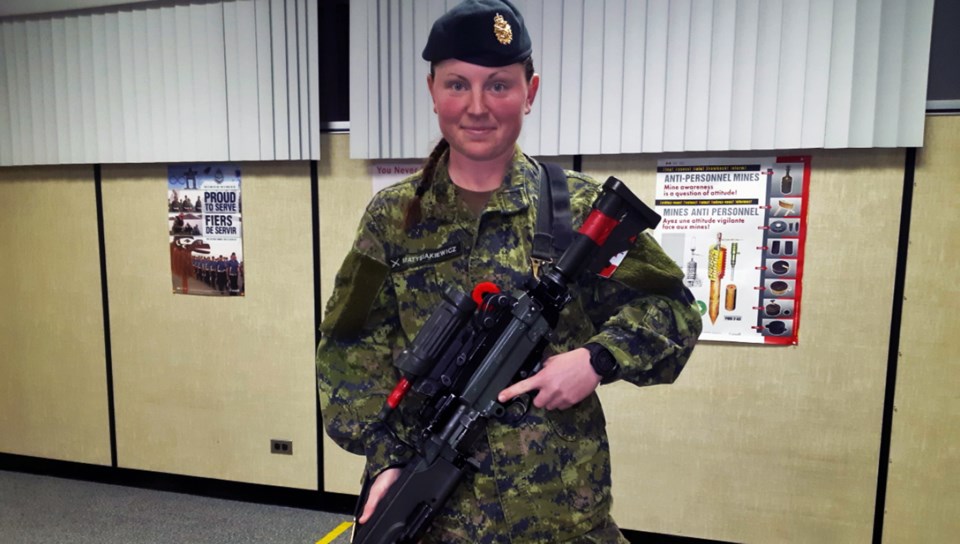The name bar on Kamila Matysiakiewicz’s army uniform is noticeably wider than that of most of her peers with the Rocky Mountain Rangers B Company.
She’s proud of her surname, which reflects her family heritage and the legacy of military service established by her dad, who as a young man growing up in Poland fulfilled his duty to join the military, which was compulsory in his country in the years before he immigrated to Canada.
When she signed up for her basic military training and joined the army reserves a year ago, Matysiakiewicz already had a career and a full-time job she still holds with Chu Cho Environmental as a wildlife biologist, which is what brought her to Prince George two years ago from her hometown of Woodstock, Ont.
As an adventure-seeker, her decision to join the army reserves took her out of her comfort zone and tested her perseverance to complete what she thought then were impossible tasks, instilling confidence and a level of physical fitness she never had before.
“Some of the times are honestly so challenging and you want to go home, you’ve had enough and everything’s sore and maybe you didn’t have a great breakfast and it doesn’t matter,” said the 27-year-old Matysiakiewicz. “You have to get up and support everyone else around you. You have to keep doing it.
“My civilian career and my personal interests have helped me a lot as a Rocky Mountain Ranger. Sleeping outside or sleeping outside with minimal shelter is not necessarily challenging for me because it’s something I might do in my spare time. One thing I learned is how to work and be outdoors in northern winters, because in southern Ontario there’s not as much snow. You learn to adjust how to dress with not a lot of layers because you don’t want to get sweaty.”
One of the aspects of an army cadet’s training that does make them sweat has nothing to do with the air temperature. It’s when they learn how to handle hand grenades.
The Rangers trained Matysiakiewicz in the use of C7 and C9 semi- and automatic rifles and she also learned how to handle explosives and on her 27th birthday she tossed her first live grenade. Trainees start by learning to toss weighted balls, then use dummy grenades that require the pin to be pulled but do not explode, leading up to the real thing.
“They’re not at fragile as you think, you could chuck one in your pocket because it’s got a pin and it’s all safe, but I just wanted to hold them so carefully and keep my eyes on them because I was absolutely terrified,” she said. “It was a feeling unlike any other to actually throw a live grenade. You’re behind a barrier and you can see through a window where you throw it and where it lands.
“A lot of the misconceptions I have are probably from movies and when you throw it you don’t shout ‘grenade,’ you shout ‘frag out. You shout ‘grenade’ when somebody throws a grenade at you.”
Not everyone makes it through the seven-week infantry course and Matysiakiewicz had her dark days of self-doubt. But she made it and earned her qualification in May.
“One of the things is there are no off-days to recover if you’re sore, so every morning we got up at 5 to either do a weighted ruck (march) or a run - every single day,” she said. “I have a sport watch and we would hit 10,000 steps by 8 o’clock every day.”
As one of three women among the 40-member B Company platoon, Matysiakiewicz says there’s no reason for women to feel reluctant to try to sign up for what has traditionally been a male-dominated occupation.
“There’s a very open supportive system for women in the Canadian Armed Forces,” she said. “Even if you don’t have experience and are intimidated by the fact you don’t have experience with firearms, for example, or you doubt your physical fitness, there are definitely people here who want you to succeed and want you to do your best.
“There’s a lot you can get out of it in terms of maximizing your potential and actually being able to give it your all., especially for physical fitness and withstanding hard conditions and struggle. Our lives maybe don’t push us to the brink all the time and it doesn’t challenge you and that perhaps is the most meaningful thing. It’s impacted my life in a positive way, more than I ever could have thought.”
Matysiakiewicz’s extended family in Poland this year helped Ukrainians fleeing the war find places to stay and she’s hoping to use her fluency in Polish is she’s ever deployed to Europe. The older generation of the family lived through years of occupation by German forces during the Second World War.
“Poland has always struggled with political conflicts and war and it definitely adds a layer of personal meaning for sure,” she said.
“My dad (Slawomir) did two years with the navy and even though he didn’t pursue a military career -he’s a machinist - and he still to this day talks about his time doing that. He’s been incredibly supportive. I know when I was on course he totally believed in me that I could do it. And he also said it was still OK if I can’t do it and go home, that’s still fine, knowing you gave it your all.”


